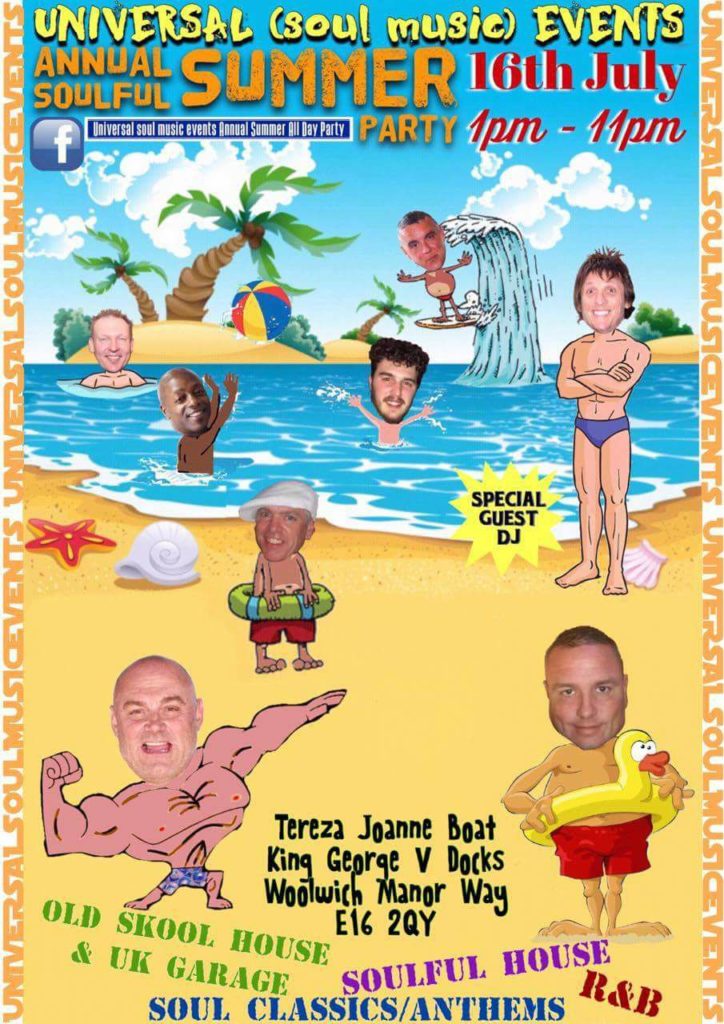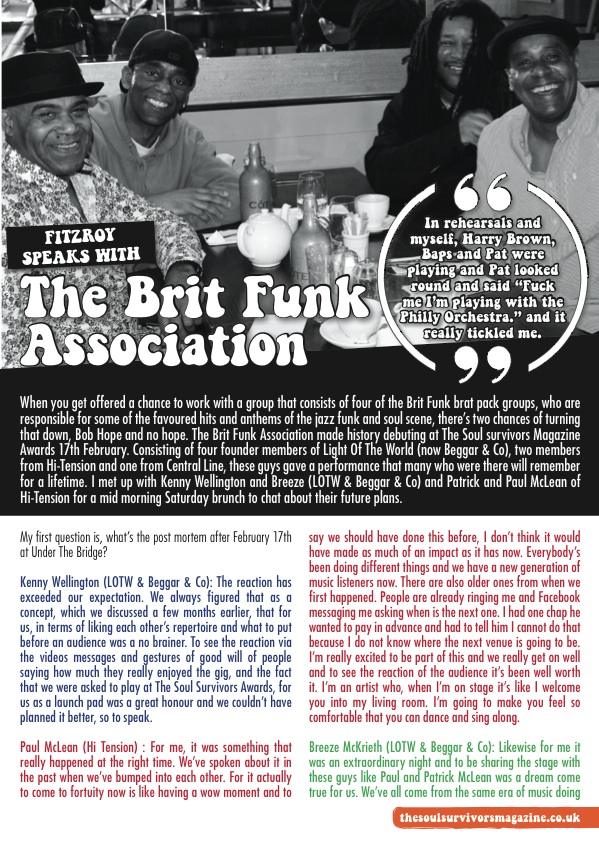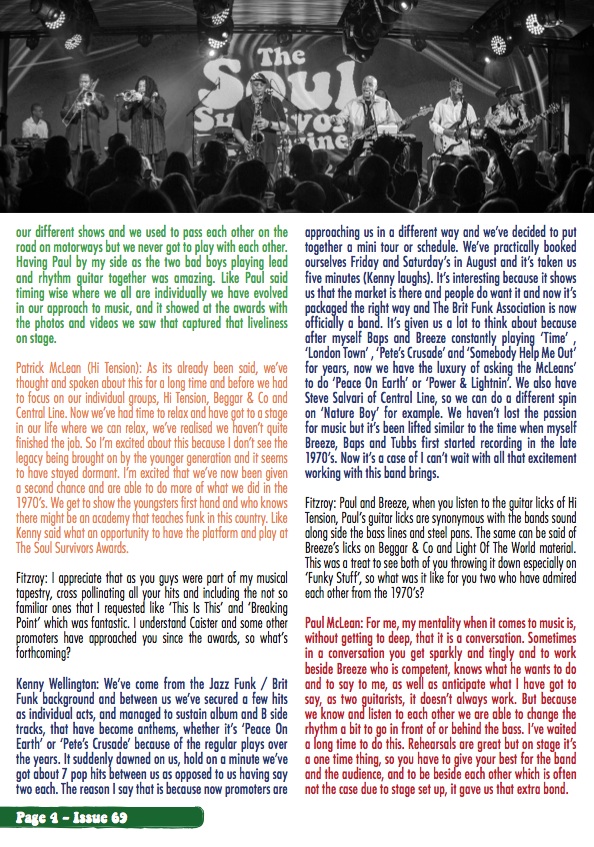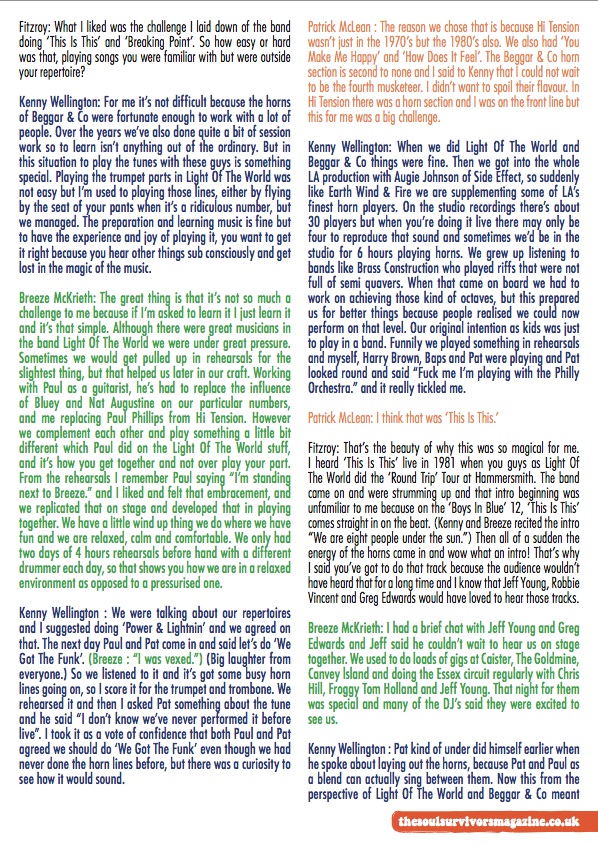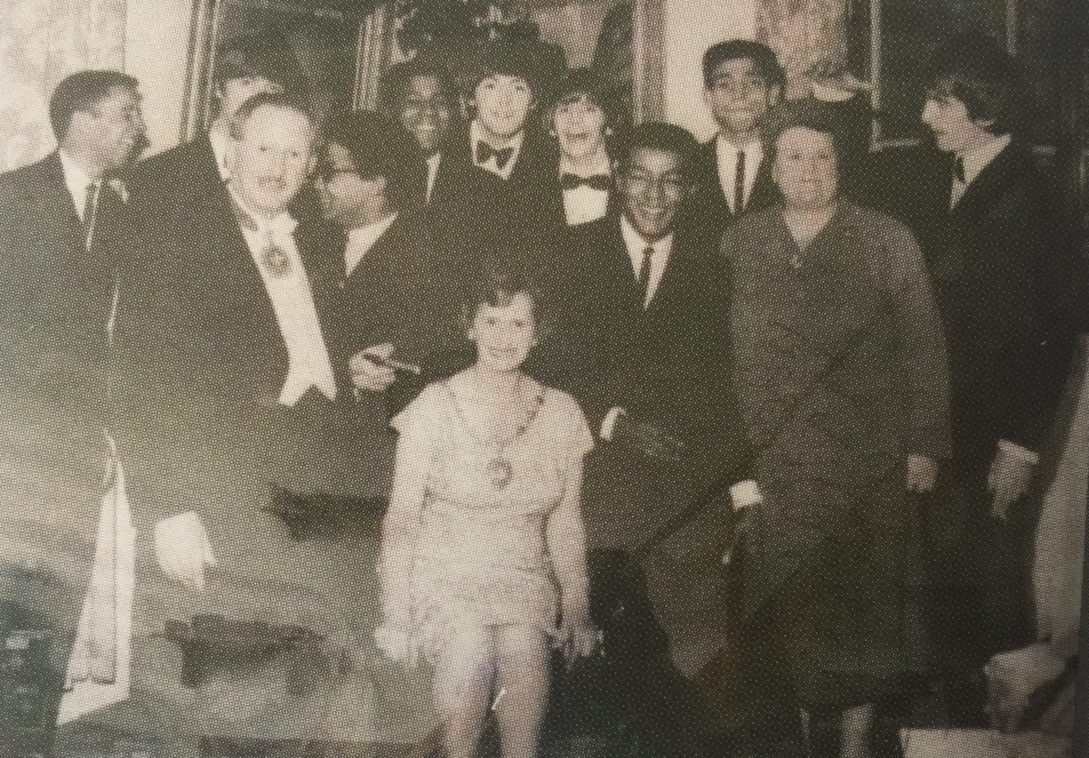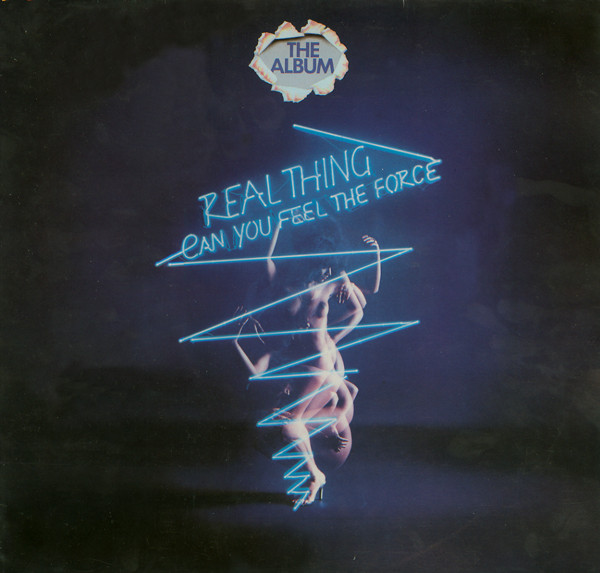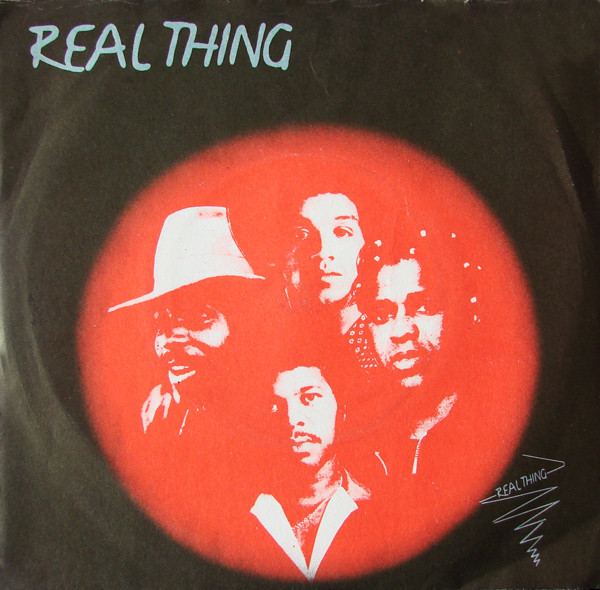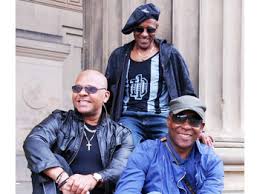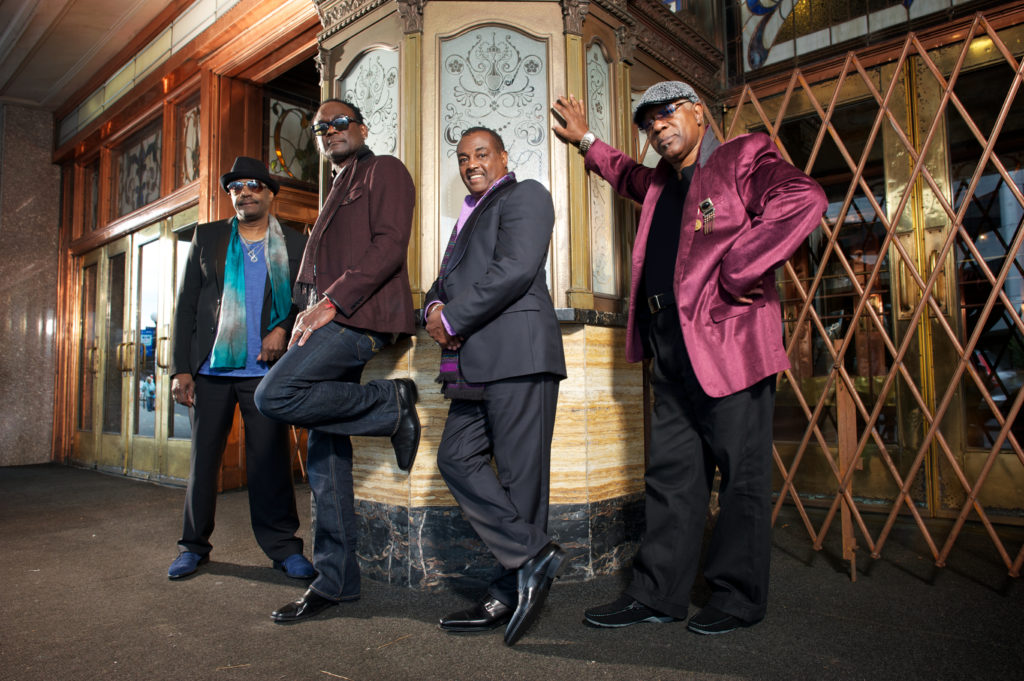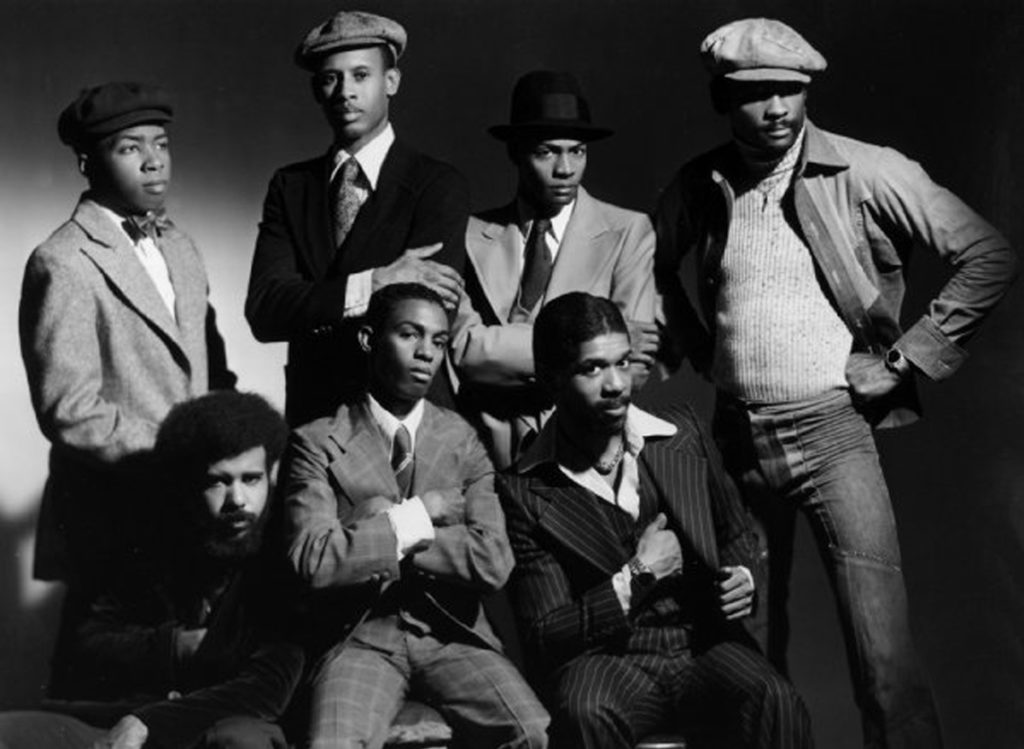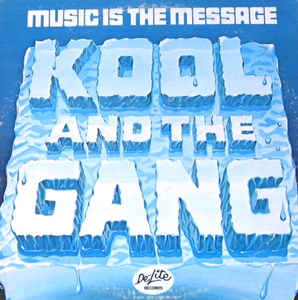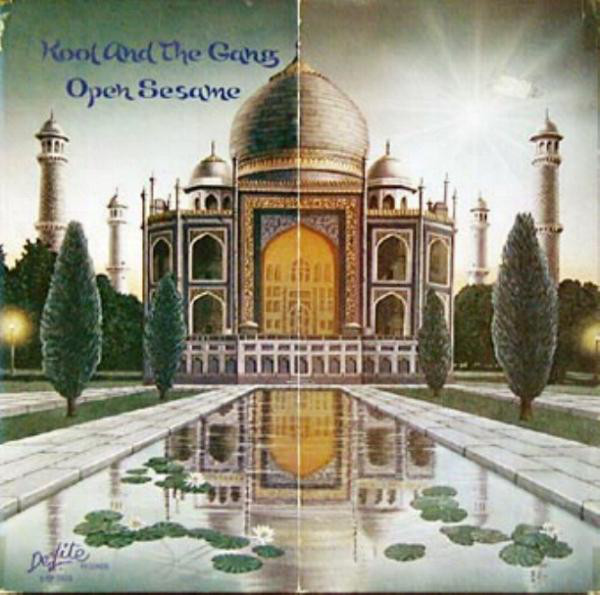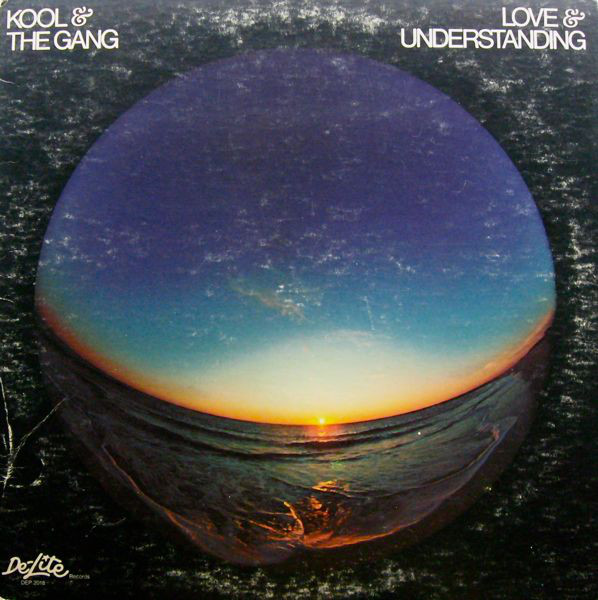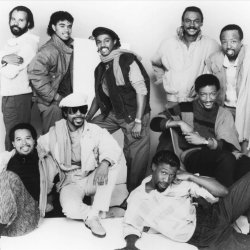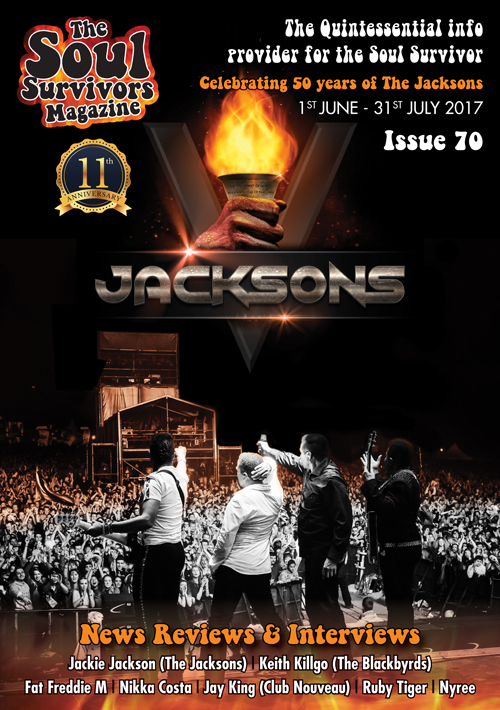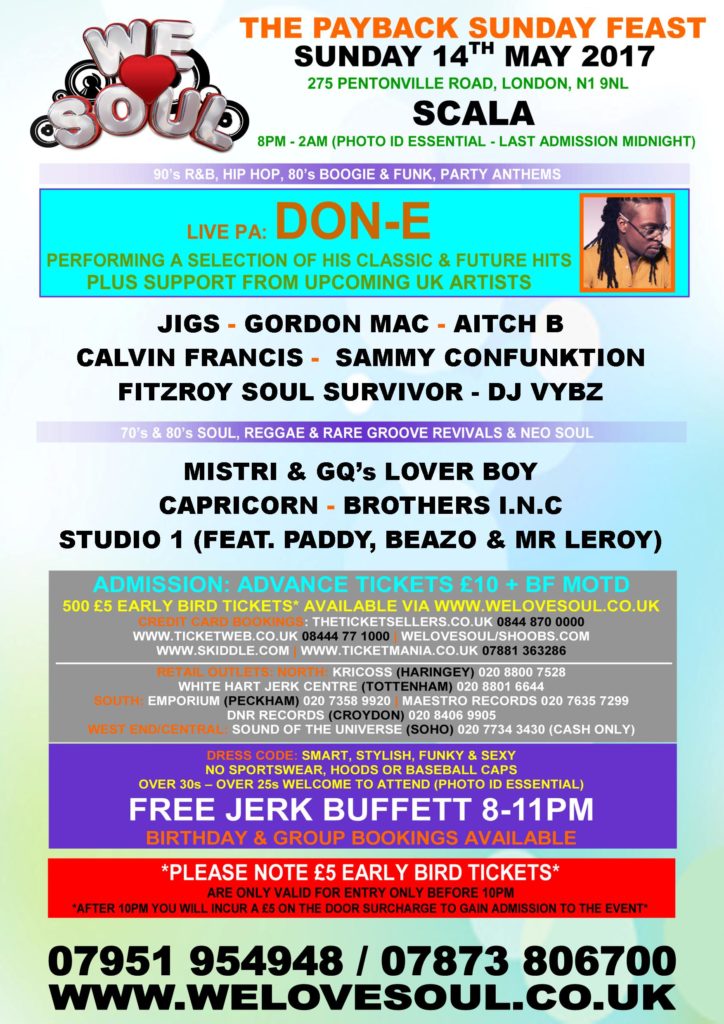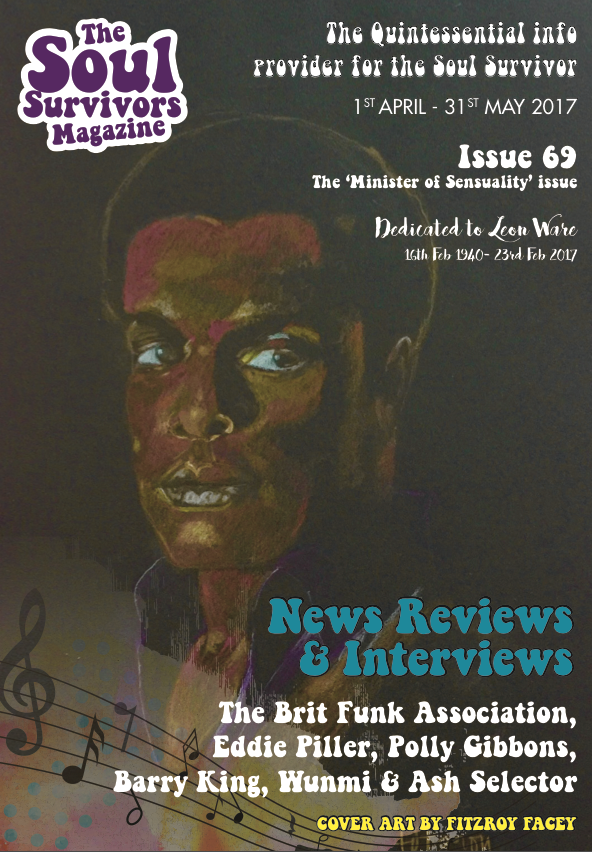After the amazingly received first instalment a couple weeks back we get ready for the Stevie Wonder ‘Hotter Than July’ sessions of a Chaka Khan ‘Any Old Sunday’. We had a good mixture of male and female dancers from yesteryear regressing like Benjaim Button to their teenage years..’Dancin’ & Prancin’ like Candido to jazz, soul, funk, disco, boogie , latin, bossa, samba and broken beat old and nu. FREE ENTRY !!
The concept is to set a scenery for people to come and chillax in the spirit of the 3 D’s Dance Drink & Dine whilst we have a season of Kool & The Gang ‘ Summer Madness’. Happy Hour until 8pm and 20% off all Food deals if you quote the Soul Survivors Magazine on the day. Come down and enjoy food, music and libation for 8 hours on a Sunday in Camden NW1. It’s less than one minute from Camden Tube Station Northern Line.
DJ’s Dez Parkes, Dezzi D and Fitzroy (Soul Survivors). Music policy all things jazz funk and soulful old and new. There will also be artwork and Soul Survivors Magazine Merchandise on sale including T shirts mugs bags and albums. So come down and enjoy this Janet Lawson ‘Sunday Afternoon’ to late evening session Sunday 25th June!! It will be the most eclectic selection of music you’ll here from three like Cameo original ‘Knights Of The Sound Table’
Check out the footage from the last one 25th June https://youtu.be/iXR7AZD7lJA
Like Norman Connors ‘Just Imagine’ the sun on a Kool & The Gang ‘Summer Madness’ day in Camden London, eating food and drinking your favourite libation between 3pm-11pm and it’s free. This mix is an indication of the soundtrack that will support that Norman Connor’s ‘Just Imagine’ moment. It all happens this Sunday at BOHO Inverness Street Camden NW1..you coming??
Click on image to listen to Mixcloud Mix
After the successful debut at The Soul Survivors Magazine 2016 Awards The Brit Funk Association are in major demand like as a live band. This Bank Holiday Sunday 27th August 2017 , they will be blessing the funk at Campsoul in Oxford so here we are sharing the entire interview published in issue 69. Enjoy Fitzroy. To get your tickets please go to http://campsoulfestival.com
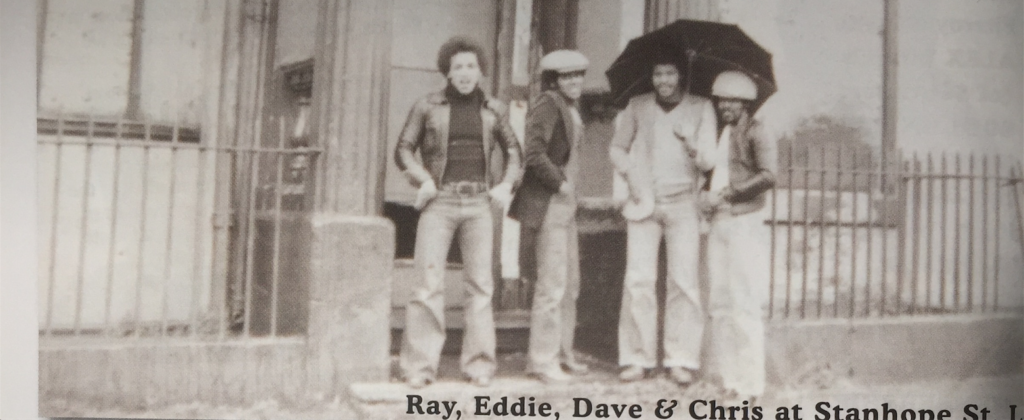 Ahead of The Real Things live concert at Soultrain’s Bank Holiday 25th August 2017 SWX gig, we at The Soul Survivors Magazine share some of the integral history from the memories of two of the groups founder members Eddie & Chris Amoo.
Ahead of The Real Things live concert at Soultrain’s Bank Holiday 25th August 2017 SWX gig, we at The Soul Survivors Magazine share some of the integral history from the memories of two of the groups founder members Eddie & Chris Amoo.
Fitzroy: I’m assuming because of your surname it’s of African origin,how did you and your family experienced life growing up in the Liverpool 8 Toxteth community in your early years of the 1950‘s and 1960’s?
Eddie: My dad, was from Ghana growing up in a poor working class area like Toxteth was tough but happy.To be honest it was so multicultural that I didn’t even become aware of racial differences till we moved out of L 8 when I was 11.I got a bit of a rude awakening when we moved to Myrtle Gardens,(L7 ) as we were the first black family to move in, kids of that peer age can be very cruel.But once we were established and accepted I was happy there.
Fitzroy: What musical artist’s were an inspiration to you as a youngster?
Eddie: My earliest musical influences were The Doo Wop groups like Frankie Lymon And The Teenagers and the R & B sounds of Chuck Berry, Ray Charles, Fats Domino and Little Richard. I was also into the early Rock n Roll of Buddy Holly, Gene Vincent, and the Early Elvis ,and gradually outgrew the latter guys. I was around 12 years old and one of the first things I learnt from watching and performing with the Beatles, was that their main strength was their song writing ability. This set them apart from the rest the bands, as well as them being damn good. So I decided to see if I could write songs even though I had no musical ability.I would make up melodies in my head,write words and sing them to The Chants. They were based on models of songs I liked (The Four Seasons ) ‘Walk Like A Man’ . I wrote a song ‘I Don’t Care’ based on the same type of The Four Seasons harmonies. In the recording studio we got lucky because our first producer Tony Hatch then added the cords and rhythm that really suited the song, in fact it became the bands first single.
Below The Chants and The Beatles in the early 1960’s with Eddie Amoo smiling in the back to the left of Paul McCartney who is standing next to Ringo.
Fitzroy: The Chants continued touring for over ten years you nurtured your songwriting and musical skills further. From around 1972 how did your younger brother Chris’s The Sophisticated Soul Brothers group with some guidance from yourself , start to gain momentum?
Eddie: Well the S S Brothers developed slowly and around 1973 Chris started to emerge as a lead singer. I was going through some stuff on the piano at our mothers house in Englefield Green in L8 when I heard this powerful voice coming from behind me. Realising it was Chris I was astonished at how he’d developed as a singer. I realised instantly that the SS brothers had what The Chants had always lacked, a distinct sound that a special lead voice provides. The Chant’s featured 5 guys with great voices and harmonies without unfortunately that killer distinct lead. It was only a matter of time before someone who mattered would pick up on this, in this case that person was Tony Hall.
Fitzroy: How was life from your perspective being the younger brother of Eddie who was already a pre-teenage superstar and what’s the age difference between you both?
Chris: There is actually 8 years between us. I was still at school when The Chants were famous and it actually instilled in me what I wanted to do. I was very much influenced by my brother Eddie seeing him in the newspapers and on TV nothing was going to stop me from pursuing my dream. As I got older Eddie started to take an interest in how I was progressing which was great. He’d teach me my first notes playing on the guitar and the piano, and this developed to me writing songs. Even though I was just plunking three or four notes on the piano, I was writing songs and Eddie encouraged this in me.
Fitzroy: What was your perspective in coming across this music via the radio and not being able to see the artist? Especially in the early Motown years where they would put white faces on the front covers, so how did you equate they were black?
Chris: I knew because it was different in my time than when Eddie grew up as a teenager. By then Motown had put an end to that nonsense. In the old days in order for an R&B song to get any exposure it would be covered by a white artist. The advent of Motown changed that because Motown was the vehicle. So in my time I knew who the artists were. We would go to the record shops where they had listening booths. On all the walls they had the photos of the black artists. My brother Eddie used to bring a lot of records into the house all of which had black faces on. When Eddie was growing up you wouldn’t know if they were black or white.
Fitzroy: So how did you come together in 1972 to form the Sophisticated Soul Brothers?
Chris: I met Dave Smith when I was still at school. His brother was a friend of Eddie’s best friend before Eddie was in The Chants. We are a big family community in L8 Liverpool and everybody knows each other. We tried to emulate The Chants who were a big deal being seen on TV’s ‘Jukebox Jury’ and being played on the radio. We started to take it a bit more seriously as we realised that this was what we were going to do. We listened to records and found our range sonically. As we started getting better we started meeting and singing every single night with hairbrushes as microphones. We practised for weeks and eventually learned how to harmonise then we started playing at school dances. We got ourselves an agent who handled a lot of the white bands and eventually graduated from The Sophisticate Soul Brothers to becoming Vocal Perfection. What’s interesting is that The Temptations who recorded the very first record that I bought actually changed our vision. Tony Hall our manager bought us tickets to see them in Manchester live and we went in as one band and came out as another. So they definitely had the most impact on us.
Fitzroy: What was it that impacted on you so greatly?
Chris: Our perception of a vocal group was three background vocalists doing a little routine behind a lead vocalist upfront. When we saw The Temptations, it was the first time we saw five microphones as opposed to two, one for the lead and one for the background vocalists. So now we saw five lead singers all with their own microphones coming off a boom stand on arms and this was so visual to us. They would also change microphones with a little bit of flair theatrics. So the next day we started rehearsing how we’d seen them do it, so it was a new way of us presenting ourselves on stage and no one else was doing this.
Fitzroy: How did the recording of ‘Vicious Circle’ come around? 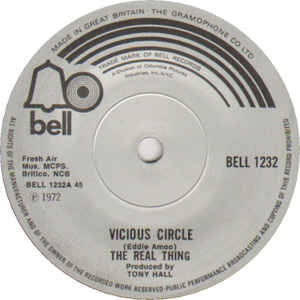
Chris: As Vocal Perfection we hadn’t made any records till we met our manager Tony Hall. We were just doing local gigs and then we landed doing Opportunity Knocks. The evening before Opportunity Knocks Tony thought it would be best if we changed our name to The Real Thing. His view being that we were setting ourselves up with a name like Vocal Perfection because perfection we were not vocally. That’s when we did our first record ‘Vicious Circle’.
Fitzroy: How did you find that whole experience of going onto Opportunity Knocks, meeting Hughie Green and experiencing what was for its time the X Factor and Britain’s Got Talent platform?
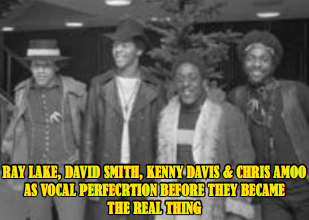 Chris: It was more Britain’s Got Talent than X Factor because a yodeler beat us. It was wonderful Fitzroy because we were on television man. We were walking down in Liverpool City Centre and everyone recognised us. That’s how big the show was. We were no longer doing little clubs but playing all over the country for quite good money. Opportunity Knocks changed everything for us as we could now sustain ourselves professionally. We did Top Of The Pops performing ‘Plastic Man’ that then went into the top 50. Had we made it big at the time of Opportunity Knocks I believe we wouldn’t have been able to sustain it creatively because were not ready.
Chris: It was more Britain’s Got Talent than X Factor because a yodeler beat us. It was wonderful Fitzroy because we were on television man. We were walking down in Liverpool City Centre and everyone recognised us. That’s how big the show was. We were no longer doing little clubs but playing all over the country for quite good money. Opportunity Knocks changed everything for us as we could now sustain ourselves professionally. We did Top Of The Pops performing ‘Plastic Man’ that then went into the top 50. Had we made it big at the time of Opportunity Knocks I believe we wouldn’t have been able to sustain it creatively because were not ready.
Fitzroy: I was 10 years old in 1974 and remember watching Opportunity Knocks and I’m trying to think back but were there ever any other black acts on Opportunity Knocks? 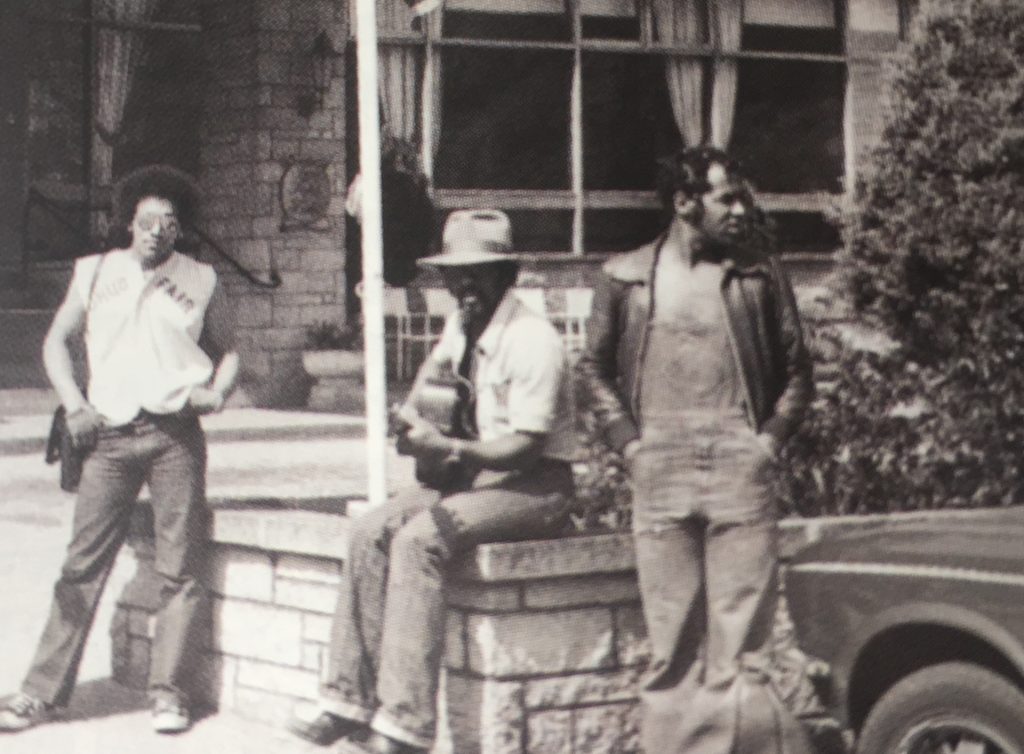
Chris: No, not that I can remember as there weren’t any other acts apart from The Chants who were more on the cabaret scene. Maybe a few years later groups like Sweet Sensation and Heatwave who we used to see all the time.
Fitzroy: So now after Opportunity Knocks and being recognised in your local area you work with David Essex.
Chris: That was our second career phase. We were recording some licenced records and Jeff Wayne came into the office and said he needed some backing vocals for adverts he was making for Cadburys chocolate. I’m sure it was actually The Chant’s he was looking for. Don’t quote me on that, but we went and did the session. Jeff Wayne loved our sound and myself as a lead singer so I started singing lead for Lloyds, TSB and Cadburys adverts. If he wanted harmonies we did Wrigley’s Spearmint Gums and things like that as a group. It was a great thing for us getting extra money for doing session work. That’s how we met David Essex because Jeff was producing him. David fell in love with our rawness and freshness. He felt we were unspoilt and were not trying to emulate the Americans. We were now writing and doing our own material in a show and David loved that about us. He took us to America with him and we met some fantastic musicians during that time.
Fitzroy: What’s you memory of coming across ‘You To Me Are Everything’ which was a departure from what you had done before?
Chris: That was Eddie’s reaction, my first reaction was “Let’s get the thing signed up, as this is a hit”. Tony and me looked at each other and it was something that hit me instantly. I’d say it was signed sealed and delivered on my side before I even met with the rest of the group later that evening. Everybody knew it was a great pop song and yes it was a departure from what we were writing which was some pretty heavy stuff at the time. We were performing on stage and papers like Melody Maker and NME used to review the show which was different to what everyone else was doing. When we actually recorded it I thought that the demo was better than ours but when it was finished the result is now history.
Fitzroy: I’m not sure if you’ve seen the previous issue where I spoke with Patrick Adams. He spoke of doing a version of ‘You To Me Are Everything’ that was rushed out before Ken Gold could get a distribution deal with a big advance. I’ve heard that version as I have many others including Frankie Valli’s awful version, but there is a good one by Samona Cooke. After The Chants, The Real Thing were the next pioneering black vocal group to be successful and potentially conquer America, so were you aware of the politics that prevented, in my view, why you were not taken so seriously in America? 
Chris: There were politics that stopped the record but I’m not too sure if that version is quite correct but I could be wrong. What I was told was that when we recorded ‘You To Me’ with Pye over in the UK all of a sudden all of the companies around the world wanted to release the record. Once we had signed our deal with Pye, all the other companies decided to rush putting a version out. At the time there were 3 versions of ‘You To Me’ in the charts and we we’re told that within 24 hours of our release Frankie Valli’s was done. Once the record was recorded Ken Gold, as the writer, would have had nothing to do with anything after that as it’s then in the hands of the record company. Tony Hall, our lawyer and a real high-powered USA lawyer, would have had to deal with those who wanted the record. Once it’s out anyone can record it. That definitely stopped ‘You To Me’ going higher with the airplay and sales splitting. The same thing almost happened with ‘Can You Feel The Force’ because we were told the wrong version went out and it killed the progress of the record but how true that is, I don’t know. One thing I’m sure of is that politics stopped both records because you can’t tell me ‘You To Me’ and ‘Can You Feel The Force?’ weren’t strong enough.
Fitzroy: Thank you for the penultimate ‘Children Of The Ghetto’ which has that unique eerie and definitive Black Afro Caribbean soul jazz meets reggae influenced military drum rhythm template .This sound was later embraced and showcased on early Hi Tension, Light Of The World and Incognito albums.I also hear some War Curtis Mayfield and EWF connotations and how ironic that EWF’s Philip Bailey’s tailor made voice covered it as well as saxophonist extraordinaire Courtney Pine?Although lyrically it’s obvious in your own words is whats the inspiration behind that monumental track and did Curtis Mayfield’s influence played a large role in the creating of ‘Children Of The Ghetto’?
Eddie: I was absolutely knocked out with his ‘Superfly’ sound track. I loved the mood of ‘Little Child ,Running Wild’ and this inspired me to writing songs relating to my own experience of growing up in a “ghetto”.I’d already dipped my toes in the water with ‘ Man Without A Face’ many years before. Chris and I wanted the same type of mood Curtis created in the movie soundtrack of that sombre mournful air of a car driving slowly through the streets as people mourned the death of Freddie. Our drummer Nigel Martinez came up with the haunting drum intro on ‘Ghetto’ which set the feel for the song. We added the jazzy riffed middle 8 at a rehearsal,and we laid it down in the studio almost live,along with the other 2 songs in the trilogy ‘Liverpool 8’ and ‘Stanhope Street’. Pete Nelson’s piano solo in ‘Ghetto’ still gives me chills as does the guitar licks and slides of Vic Lynton. I think ‘Ghetto’ really captured what we had tried for so long to project, and it really brought us a lot of media attention.I wasn’t surprised when in 1985 it was covered by Courtney Pine.
Fitzroy: Taking about the ‘4 from 8’ album, being black myself and seeing a reflection of my own image doing something positive and being recognised for it, especially being young at that time in the 1970’s was very empowering. Seeing Michael Jackson and The Jackson 5 from the USA is one thing but to see a UK act make a concept album reflecting how you lived. With songs like ‘Stanhope Street’ and ‘Children Of The Ghetto’, years later, I got to take my hat off to you for reflecting what was happening in the UK. In the USA early Roy Ayers, Gil Scott Heron and Curtis Mayfield were speaking about the social economics and politics of the time which is hard hitting with their plight deriving directly from slavery. You can tell there is depth and reality in the ‘4 from 8’ album. David Essex advised you to tone that down because he feared how the record companies and audience would deal with that. How did you deal with that and what or who decided that Ray Lake would do the lead vocal on ‘Children Of The Ghetto’?
 Chris: David Essex loved that element of us but he was very astute in his commercial foresight. He advised us in a nice way knowing we had success with three hit records, ‘You To Me’, ‘You Never Know What You’re Missing’ and ‘Can’t Get By Without You”. David knew about our conscious side because we used to sing it live when we toured with him on stage. He said we had to be careful because the fans who had bought our hits would find that too deep. He said they wanted to hear the happy go lucky pop dance records they had bought and knew. How we dealt with that was to mix a section of records that we really believed in with some sophisticated pop songs. Back then on an album, we’d look to get two pop songs amongst the material, we wanted to feature to show what we could really do. In a way we got it very very wrong as the fans certainly didn’t want to hear ‘Children Of The Ghetto’ and ‘4 from 8’. However the media loved it as we had front page spreads in publications like Melody Maker. We were very stubborn and took the risk. We had a fantastic manager who believed in us so we could be ourselves. Although we may have lost sales it gave us a bit of longevity. The funny thing is that those who didn’t appreciate it then appreciate it moreso now because they love us and want to hear more than the recognised hits. In answer as to why Ray Lake was chosen to do ‘Children Of The Ghetto’ that was because his voice suited the song. When you have a group it has a tenor a bass and a soprano. When we got an MJ song Ray would sing it, and if we sung a Teddy P song Dave or myself would sing it. Initially when we did ‘Children Of The Ghetto’ in our show Eddie wasn’t in the group and Ray who had a voice like Smokey Robinson would do the high voices. When Eddie joined he would then share the high notes with Ray.
Chris: David Essex loved that element of us but he was very astute in his commercial foresight. He advised us in a nice way knowing we had success with three hit records, ‘You To Me’, ‘You Never Know What You’re Missing’ and ‘Can’t Get By Without You”. David knew about our conscious side because we used to sing it live when we toured with him on stage. He said we had to be careful because the fans who had bought our hits would find that too deep. He said they wanted to hear the happy go lucky pop dance records they had bought and knew. How we dealt with that was to mix a section of records that we really believed in with some sophisticated pop songs. Back then on an album, we’d look to get two pop songs amongst the material, we wanted to feature to show what we could really do. In a way we got it very very wrong as the fans certainly didn’t want to hear ‘Children Of The Ghetto’ and ‘4 from 8’. However the media loved it as we had front page spreads in publications like Melody Maker. We were very stubborn and took the risk. We had a fantastic manager who believed in us so we could be ourselves. Although we may have lost sales it gave us a bit of longevity. The funny thing is that those who didn’t appreciate it then appreciate it moreso now because they love us and want to hear more than the recognised hits. In answer as to why Ray Lake was chosen to do ‘Children Of The Ghetto’ that was because his voice suited the song. When you have a group it has a tenor a bass and a soprano. When we got an MJ song Ray would sing it, and if we sung a Teddy P song Dave or myself would sing it. Initially when we did ‘Children Of The Ghetto’ in our show Eddie wasn’t in the group and Ray who had a voice like Smokey Robinson would do the high voices. When Eddie joined he would then share the high notes with Ray.
Fitzroy: How did you guys end up performing ‘Let’s Go Disco’ in the Joan Collins flick ‘The Stud’? 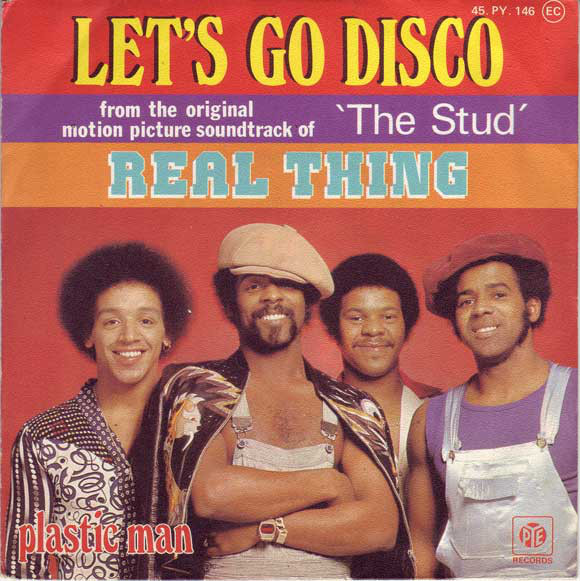
Eddie: I had an idea this question would rear its ugly head.We got a call from Tony Hall that Biddu wanted to try writing some songs with us, which we thought was rather odd. Anyway we got a call to say Biddu had a track that he wanted us to throw some vocals on so we went to his studio and he played the track to us.We felt the track was ok but we didn’t like the tune or lyrics, however as it took an hour or so to do our vocals and didn’t see the harm in doing it, thinking it was never going to see the light of day .Then we got a call from Tony Hall advising that the track was going to be featured in a huge Joan Collins movie and they wanted to cash in. The record company were considering ‘Disco’ as a single if we were guaranteed a spot in the movie performing the song. We were mortified but as we had dipped out feet in very muddy waters we couldn’t get out of this. So we had to see it through ….I think the phase “the less said the better works here”.
Fitzroy: Was there any concept link to Star Wars in writing the top 5 hit ‘Can You Feel The Force?’ a massive continued break through for the group?
Eddie: I had this idea for a song called ‘Get The Message’ and me and Chris were knocking it about and trying a few things. I went to see Star Wars and straight away I got a buzz for a possible hook with the force in it. We sat down and we built it around that phrase line “There’s a mood going around the world today …Can you feel the force” .
Fitzroy: ‘Can You Feel The Force?’, I loved the energy of that record and it was the very first 12-inch I boughtand you got to do Top Of The Pops even with that blip you mentioned that went out in America.
Chris: ‘The Force’ first time around actually outsold ‘You To Me’ selling more copies and was a top five record.
Fitzroy: For me personally I loved ‘Boogie Down’. (Chris: “Yeah, it was different wasn’t it?”) which was slower funkier and a continuation of ‘The Force’.
Chris: You know where that went wrong was that Ken and Lynton didn’t produce that song. If we had kept working with Ken it would have been bigger. We had a magic with him where he would have sussed the little things that were missing, We recorded ‘Boogie Down’ in France and the demo was much better and funkier but the best version was remixed by John Luonga which was received well in America.
Fitzroy: Though there were several underground UK soul outfits FBI, Gonzales, Cymande and even Sweet Sensation who endured a shorter commercial appeal similar to yourself, The Real Thing were flying the flag solo for an all black / predominately black group. Hot Chocolate were seemingly more accepted as a multicultural crossover success,but theres no escaping resistance element and racism blatant or subtle. You’d have faced this in and out of the music industry between the 60‘s and 70‘s with the changing face of Britain. So how did you and the rest of the group view and deal with getting the musical balance and compromises needed to make things work?
Eddie: This is how we see it Britain is a white country and its biggest crossover will always be the rock based bands or the ‘blue eyed boy bands’ that is fact and cannot be altered. This is the reason many talented black bands like Loose Ends have not prevailed and gone on to achieve what should have. Therefore once you succeed in getting your audience the trick is to hold on to it, while retaining your creative integrity. Sadly I see a lot of bands who have arrived but just going around earning their money and not trying to advance themselves with the power of their show. You cannot do anything about the subtle racism of show biz and the media, but our show is our direct link to our audience, and that’s were we make our stand. When we walk out there on stage be it an arena, a theatre or a club we always give it our all. So the people who actually dig us are not disappointed and will keep coming back. To summarize you cannot fight the racism that subtly closes doors to you and denies you credibility for what you have achieved, but you can make the best of what you have got.
Fitzroy: In the late 1970’s most of the UK black acts were from London, but I struggle to think of many black acts other than Rebecca Ferguson more recently who came from Liverpool. You must on one hand be proud to represent your race and also coming from Liverpool, which transcends the immediate African Caribbean community because Liverpool people love being Liverpudlian. I’d like to think that there will be some kind of monument to honour The Real Thing. What do you think will be the legacy of The Real Thing as a band whose been universally going for over 40 years and next to the Rolling Stone are the an institution for flying the flag of home grown mature Britain’s Got Talent?
Chris: I think I’d like us to be remembered as a black band who created their own brand of music. Who from day one have not tried to emulate their American counter parts but tried to maintain the level they set. One thing about black music and what I’ve learned is that in order to sustain and last the distance you have to be good. It’s not about a look it’s about having class. I think we open the doors for a lot of British music and kept the flag flying. I’m like you Fitz black music is always evolving, where as white music stays the same. If you dug out the Rolling Stone from 1960 they are the same now as they were then, but older. If I’m judging I listened to The Temptation in 1970, by the time I’m 20-22, I’m starting to listen to Earth Wind & Fire, then I’m progressing to Marcus Miller and Earl Klugh. So it’s evolving all the time as it’s not easy to keep that base you start off with in black music. I want us to be remembered as a band who has kept the music evolving throughout the decades, does that make sense?
Fitzroy: You have experienced first hand from the early 60’s the infrastructure of the Liverpool 8 black community mixed with African and West Indians who frequented the Ibo Yorbo Silver Sand Gladray, Dutch Eddies and Stanley House venues, according to our Soul Survivor member Raph Parkinson ( a native and local to that area black Liverpudlian). With Liverpool’s cultural and colonial economy history how would you describes the black communities significant contribution to music UK and beyond, as it doesn’t appear to be universally recognized or rarely gets mentioned?
Eddie: I have my own take on L8 s contribution to the UK music scene. The thing that shaped the Mersey beat explosion which in turn helped to reshape the whole British music scene for years to come, was the exposure to the music of artistes such as Chuck Berry, Little Richard, Fats Domino, Ray Charles and The Coasters. Followed later by Motown acts such as the Miracles Little and Stevie Wonder. Almost the first words The Beatles said to us when we first met them was “Have you heard the artistes on this new label out of the States, The Miracles, and there’s this little blind kid called Stevie Wonder?” If you asked me what I felt our contribution was it would be this…like us or hate us WE became the first UK Black group to to be taken seriously and to be allowed to write and produce our own songs. Therefore we set the trend which has grown in strength ever since.
Fitzroy Facey (The Soul Survivors Magazine)
The Real Thing are performing at Soul Train’s August Bank Holiday event @ SWX Bristol with a full live band 25th August 2017. They will be performing their classics mentioned in this interview, so I’d get your tickets and make sure you ‘Boogie Down, get funky now’. Buy tickets from https://www.ents24.com/bristol-events/swx-bristol/the-real-thing/4935102
Fitzroy speaks with Robert ‘Kool’ Bell and Ronald Khalis Bell bassist and horn players of Kool & The Gang who are performing at The Indig02 this Sunday 11th June 2017, the first of a few UK dates!
Fitzroy: How was early life in Ohio with you, Robert, being the eldest and Kevin, the youngest forming The KG’s and at what point did you move to New Jersey?
Robert : I left Ohio in 1960 when I was 10 years old and our group came together in 1964. At primary school I met Dennie Thomas, George Brown, Rick West and Claydes Smith. We first called ourselves The Jazziacs. Going back to being a youngster, I didn’t know I was going to be in the music business. I was two years old and my Grandfather had me working with him underneath the car, and my Grandmother would holla “Get that boy out from under the car.’ When I was 7 years old I built my own motorbike by taking a lawn mower motor, and putting it on a bicycle frame. Before we left Ohio in 1960 my brother Ronald and I used to beat paint cans like bongos, and depending on how much paint was inside, this would determine the tone of the sounds we made. When we moved to Jersey City my mother bought me some bongos. I later went on to the bass guitar when I was 14.
Whilst you picked up the bass and who were your bass influences?
Robert : Spike Mickens our trumpet player and his brother who played the bass guitar, used to practice at their home. I’d go there and fool around with the bass. I could play one song, Herbie Mann’s version of ‘Coming Home Baby’. My brother suggested when we were playing at the Cafe Mar in the village area, to play ‘Coming Home Baby’ on the bass, and I could do that all on one string. That was the beginning of my bass career. During that time Mr Charles Smith who became our guitar player when we joined the Soul Town Band, used to show me how to play different licks. We became the back up band for Soul Town. Soul Town was trying to be like Motown and we had eight to ten artists and had to learn how to play Motown songs behind these local artists, and that is how I started learning my chops. At that time whilst we were the Jazziacs, I was listening to bass players like Ron Carter, Reggie Workman of The Jazz Crusaders on the jazz side, and at the same time James Jamerson of The Motown Funk Brothers on the R&B side.
Fitzroy : Ronald with influences ranging from Miles Davis, John Coltrane & James Brown, where were your early gigs and do you have any memories of individual talent who broke through in the late 60’s early 70’s?
Ronald : I remember my father who was a professional prize fighter bought home a stereo and I was fascinated at this thing going around by itself playing music. Our Jazz influence being our first love came from Miles Davis, John Coltrane, Charlie Parker, Duke Ellington, Count Basie and Herbie Hancock. Because I played saxophone John Coltrane and Joe Henderson, Wayne Shorter, Archie Sheppard, Sonny Rollins to Art Blakey and the Jazz Messengers we kind of emulated them. Listening to a lot of Motown we worked with an organisation called a Soul Town out of Jersey City trying to emulate the Motown artist so that’s where we got our muscle in R&B influence from The Temptations, The Marvelettes, Stevie Wonder, Earl Van Dye & James Brown. Regarding memories At the café Wah, before we became Kool & the Gang we used to frequent there, Bill Crosby, Richie Haven and Richard Prior was there and we used to play for sandwiches. Yeh potato chips ‘Coming Home Baby’ by Ben Tucker and Herbie Mann we used to love playing that, in fact Kool used to practice bass to that!!
 Fitzroy : How did you acquire the name Kool?
Fitzroy : How did you acquire the name Kool?
Robert : Ok let me go back to Ohio. In the neighbourhood we had little street gangs and as a country boy coming to Jersey City, I had to adapt to what was going on. I noticed there was a guy who called himself Cool spelt with a C. I liked that and decided to take the name on as my nickname and spelt it with a K, not knowing that it would eventually inspire the name Kool & The Gang. When we became part of Soul Town and left to work at the Blue Note Lounge in Jersey we decided to make a name change from The Jazziacs. The clubs MC was a part of Soul Town and came up with an idea to advertise us in the window as Kool & The Flames. My name was in a block of an ice type font with the Flames name as a melted one. Our first manager Gene Redd advised we shouldn’t use the name Flames because of James Brown & Famous Flames and we didn’t want to have any problems with the Godfather. We went thorough a few names and decided upon Kool & The Gang. That was in 1968, which will be 50 years next year.
Fitzroy : The sense of black pride obviously had an influence on you during the 60’s Mohammed Ali, Nation of Islam and the clench fist of the Olympic medalist’s. At what point did you become influenced to change your way of living and become Muslim?
Ronald: The Islamic influence – well at the time everyone was trying to raise their consciousness, afro and the Afro American experience was all around, I guess it was time for change we were listening to Martin Luther King, Malcolm X, Elijah Mohammed speak all this energy for us, John Coltrane being a revolutionary in music, I don’t see it as a change I don’t divide religion up it’s like music is just one note. I read the bible, the Koran, the bahagamagita and lots of other things. It just evolved as a way of life and Islam was the only one that excluded none. It didn’t seem right to me to that the creator would not include all people. John Coltrane…he summed it up for me perfectly…a ‘Love Supreme’. I can’t speak for no one else but for me Islam translate into peace in Arabic, Muslim in English means one who submits themselves to the creator, and all people eat the food and breathe the air provided by the creator so I don’t see any difference in how we should treat each other.
Fitzroy : Same question to you Robert
Robert : During that time we were still young at grammar school and we used to play for different events. The Nation Of Islam would have an event they called The Bizzare, which had vendors, food and entertainment. We became the band that played for those events and we also did some fundraisers for the Black Panthers around the neighbourhood at the time. It wasn’t until a few years after that my brother and I decided to be come part of The Nation Of Islam around 1971-1972.
Fitzroy : I personally love ‘Music Is The Message’ as an album with the title track, ‘Soul Vibrations’ and ‘Funky Granny’ with your distinctive bass playing. How did you feel that the marriage between you and Claydes Smith worked? As with your individual guitar parts, yours are a few simple melodic impromptu notes and not pluck and thumping like Larry Graham and Claydes guitar is a very infectious lead?
Robert : Well we established that at Soul Town doing the Motown tracks and we shared and learned the tracks. Claydes was always simple but sophisticated and you hear that on tracks like ‘Funky Stuff’ especially when they do all the double mixing in the studio. Even Prince before he died said the first record he heard on the car radio was ‘Funky Stuff’.
Fitzroy : There were lots of east coast street bands like Fatback, Brass Construction, Crown Heights Affair and later Cameo cutting their teeth on the street funk. With all their different individual sounds, what was in the air to inspire that creativity and what was the edge that Kool & the Gang had as to why they were so successful with ‘Funky Stuff’ and ‘Jungle Boogie’?
Robert : We were incorporating our 1960s experience as The Jazziacs and what we learned of Motown at Soultown, listening to James Brown and being inspired by Sly & The Family Stone. We established ourselves with jazz & RB influences, which became the Kool & The Gang sound of the 1970s. We carried that through till we changed our sound again in 1979 when we added JT Taylor as a lead singer. I was hanging out in New York and every Friday night was ladies night so when JT became our lead vocalist we created the song ‘Ladies Night’ and now our sound has changed again. We became more pop, with ‘Ladies Night’, ‘Celebration’, ‘Get Down On It’, ‘Joanna’ etc. etc. It became an evolution of our music and we started writing those kind of songs because we now had a singer. Our producer Deodato said “Listen guys we got a singer in the band now and you have to make room for the singer”. We said, almost reluctantly, ok. (Robert laughs.)
Fitzroy : Your writing and productions are typical of that spirited era. Other street funk bands, Fatback, Brass Construction, label mates Crown Heights Affair, Mandrill, War and the KG’s also fused jazz soul and funk into a ménage I can only describe as musical magic. Was it difficult to maintain your individual imprint as most of the above acts had a brass section and their own brand of groove?
Ronald: It’s pretty much like today in Hip Hop like back in the Be Bop era people were listening to each other. Our sound was defined I think by the horns because that was primarily instrumental in a street background and the late Charles Smith came up with these incredible guitar line that were almost like James Brown but not quite it. The way he expressed himself playing those licks on ‘Funky Stuff’ our first record ‘Kool & the Gang’ it was all influence from our predecessors that came before us. We just carved out what we liked. I remember when I first heard the ‘Nutcracker’ I was in the 3rd grade in Ohio and that influenced me later to do ‘Open Sesame’ some of that sounds similar as well as John Phillip Souza music is universal. We’d listen Brass Construction to Art Blakey & the Jazz Messengers and Earth Wind & Fire and the Commodores. Ask Maurice White he played behind John Coltrane, Ramsey Lewis and Charles Stepney. We listen to everybody Marvin Gaye, Stanley Turrentine, Elton John, and The Beatles The Stones it was all there. Like I said before we had to back up Tina Turner & Temptation, Sly & the Family Stone wanna be’s. We started trying to make our own sounds that’s when we became creative.
Fitzroy : Which is you favourite Kool & the Gang album and titled track?
Ronald: Favourite album was the best recording, it was fun and fondest memory, we recorded it for 6 months that was ‘Kool & the Gang’ by Kool & the Gang. Favourite Kool & the Gang song would be ‘Celebration’
Ronald : Because everyone around the world has been living the dream and manifested actually. I had no idea that song would be what it is, it had a great groove on it and we were focused after ‘Ladies Night’ to continue with music as a pursuit. We started covering some tri ad cords like rock & roll and simplistic cord changes. I read some scriptures where man was being created by god and the angels were celebrating and praising god for doing that. That’s where the inspiration for ‘Celebration’ came from. That may be my favourite song “So every one man woman and child human being around the world come on”!!
Fitzroy : What’s yours Robert?
Robert : That kind of a hard question but I’d have to say ‘Ladies Night’ the first single with JT Taylor because I came up with the title.
 Fitzroy : Like most player bands of the time, vocals were not your main strength but you managed to do what I call the ‘hustle chant’ which is more like party lyrics (Robert: “Yes, chant music” (Robert laughs.) You created hits like ‘Jungle Boogie’, ‘Hollywood Swinging’, ‘Spirit Of The Boogie’ and the huge crossover jazz funk disco cut that made the ‘Saturday Night Fever’ soundtrack, ‘Open Sesame’. What actually inspired ‘Open Sesame’ as I remember a children’s program Banana Splits with the Arabian Knights cartoon that resonated with me whenever I hear ‘Open Sesame’?
Fitzroy : Like most player bands of the time, vocals were not your main strength but you managed to do what I call the ‘hustle chant’ which is more like party lyrics (Robert: “Yes, chant music” (Robert laughs.) You created hits like ‘Jungle Boogie’, ‘Hollywood Swinging’, ‘Spirit Of The Boogie’ and the huge crossover jazz funk disco cut that made the ‘Saturday Night Fever’ soundtrack, ‘Open Sesame’. What actually inspired ‘Open Sesame’ as I remember a children’s program Banana Splits with the Arabian Knights cartoon that resonated with me whenever I hear ‘Open Sesame’?
Robert : My brother Khalis wrote that song and it was our approach to the dance floor sound, which was dominated by Barry White, Donna Summer, and dance records happening at the time. We wanted to do something but make it jazzier. So we looked into listening to the kind of scales of someone like John Coltrane. That’s when my brother came up with the horn line because Earth Wind & Fire was out there doing their thing, so my brother came out with ‘Open Sesame’ with those Arabian scales horn lines. Really my brother was just experimenting and the band said ‘What was that, that your brother did?” when he brought that into the studio. (Robert laughs).
Fitzroy : What was the inspiration for ‘Summer Madness’ and adding the soothing jazzy vocals from Something Sweet female vocalists on the extended live version?
Robert : ‘Summer Madness’ was a vamp from a song called ‘You Don’t Have To Change’ from the ‘Light Of Worlds’ album. If you listen there’s a keyboard change of the song vamping out and my brother said “Hey that’s two songs in one”. One night he had just got the Arp Pro synthesiser and was messing around with it till 5 o’clock in the morning. He took the second part of ‘You Don’t Have To Change’ and put a solo on it with the Arp, then Claydes came and played his guitar and we decided to call it ‘Summer Madness’. We didn’t know that the song would become what it is today with Will Smith getting a Grammy for ‘Summertime’ and other rappers and movies using the song.
Fitzroy: Your trade mark music of the early funk jazz era focused universal love peace, unity and “getting down” with the consciousness like the other “super group” who shared a similar kind of success EWF. You seem to source your energy from Africa but share its history with the world regardless of their origin. Was that easy to convince the corporate record company headed by Polydor?
Ronald : Wow oh how to answer that….In a sense we had a record company that allowed us to do whatever, they saw us a creative energy, entity and source. There were times when it was questioned but they were supportive. But when they asked us to make some more commercial music we decided to. Gene asked us to do ‘Soul Makossa’, our focus became sharper and had already been educated coming through the Motown era how to do that
Fitzroy : Did you do ‘Soul Makossa’?
Ronald : No we did ‘Jungle Boogie’ instead; right now “Jungle Boogie” is ranking with ‘Celebration’
Fitzroy : ‘Everybody’s Dancing’ for me was ‘Open Sesame’ part 2. It’s clear that by 1978 there was some pressure to produce a disco hit, which most player outfits leaders like Fatback’s Bill Curtis, Brass Construction’s Randy Muller and Cameo’s Larry Blackmon, whom I’ve spoken with, agree it was make or break with their respective record companies. How did you recruit JT Taylor to record that game changing ‘Ladies Night’ single and album and end up working with Deodato?
Robert : OK long story short. We were doing a tour with The Jackson 5 at the time and Dick Griffey of Solar Records said he like the excitement we were creating on the tour and suggested we needed to get a lead singer. We’d never really thought about it before but realised it was a good idea as Earth Wind & Fire had Phillip Bailey and Maurice White and The Commodores had Lionel Richie. So we were rehearsing at The House Of Music in New Jersey on another album. Deodato was working there and JT Taylor was working with the manager of who owned the studio. We didn’t go through the auction mode as my brother asked JT to come to the studio and he played him some various chord changes for JT to sing to. We liked him and said, “You’ve got the job”.
Fitzroy : You’ve come to the UK many times, of which I saw you at the Indigo back in 2008 and are coming very soon to perform dates, including with The Jacksons. Now that is a line up of full value for money. Will you be including some of the connoisseur jazz/street funk classics as well as the obvious commercial and party ones?
Robert : Yeah we still do ‘Funky Stuff’, ‘Jungle Boogie’, ‘Hollywood Swinging’, ‘Open Sesame’ and ‘Summer Madness’. We got a new single but not sure about the UK airplay called ‘Sexy’. (Fitzroy: “Ok I haven’t heard that.”) It went to number 15 in the top billboard Urban AC chart.
Fitzroy : Thanks gents
Ronald and Robert : Thanks Fitzroy
‘Doctor My Eyes’ please do not deceive me as I’m Looking Through The Window’ because ‘Ready Or Not’ issue 70 of the Soul Survivors Magazine is arriving at SS HQ Today and not ‘Maybe Tomorrow’. ‘I’ll Be There’ to on this ‘Hallelujah Day’ regardless of whether there ‘Ain’t No Sunshine’ to greet Postman Pat or Patricia when they are delivered. So it’s as simple as ‘ABC’ to make sure you get yours, the 11th anniversary edition for June & July 2017. When it arrives I’ll be singing the J5 classic ‘It’s Great To Be Here’ loud and proud!! So for ‘One Day In Your Life’ ‘Do The Right Thing’ like Spike Lee ‘Get It Together’ and own one of these special edition copies with The Jacksons celebrating 50 years on the cover. Check out the news reviews and interviews with Jackie Jackson, Keith Killgo (The Blackbyrds), Fatfreddie Morrison, Nikka Costa, Nyree, Ruby Tiger & Jay King (Club Nouveau ).
Greeting on this Throwback Thursday..l’ll be going Black to Da Future so to speak, by jumping into my virtual Dlorean, with a return to doing a guest show on Solar Radio this Bank Holiday Monday 29th May 2017. I’m looking to ‘Spread Love’ like Al Hudson & The Soul Partners, with an eclectic selection between 3pm-6pm and will be ‘Coming To You Live’ like Charles Earland ‘On The Radio’ like Donna Summer, so ‘Tune In’ like Pleasure. I’ll be in the mix with my bag of tricks like I have been doing since 1986, so I’ll see if we can open the ‘Request Line’ like Zhane, so for any shouts and dedications ‘Holla’ like Ja Rule !!
Pinch punch 1st of the month and no returns. This is no April Fools joke..issue 69 for April & May 2017 is ‘Coming To You Live’ like Charles Earland very soon..dedicated to the late ‘Minister Of Sensuality’..Leon Ware and featuring news reviews and interviews with The Brit Funk Association, the ‘Modfather’ Eddie Piller, jazz vocalist Polly Gibbons, KFP’s Barry King, African dance queen and vocalist Wunmi and Quadrupal Soul Survivors Award winner Ash Selector aka Ash Sethi..It’s going to ‘Fabulous’ like Jahiem. Before I forget my manners..thanks to Ayshea Scott for making my spirtiual and mental thoughts manifest into a physical one. To get yours subscribe via http://www.thesoulsurvivorsmagazine.co.uk/membership/
11 years in July..we are the ‘Quintessential infer provider for the soul survivor’


